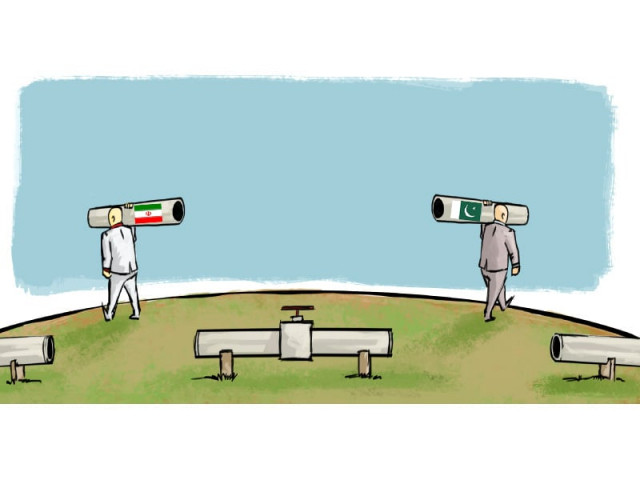PML-N govt diverts IP pipeline funds to cover fiscal deficit
Seeks to amend GIDC Act to allow it to manipulate gas prices at will.

Seeks to amend GIDC Act to allow it to manipulate gas prices at will. ILLUSTRATION: JAMAL KHURSHID
The PML-N government has seemingly put the Iran-Pakistan (IP) gas pipeline project on the backburner by deciding to use the funds generated through the imposition of the Gas Infrastructure Development Cess (GIDC) to bridge the fiscal deficit.
The previous government had imposed the GIDC on gas consumers to generate the $1 billion needed to finance the construction of the IP gas pipeline, but the PML-N government is seeking discretionary powers from Parliament to raise gas prices through the cess, in order to bring them at par with prices of other alternate fuels.
Officials said the move may result in a massive rise in gas prices for all consumers except domestic consumers – including the CNG and fertiliser sectors and captive power plants – if the government decides to rationalise gas prices and bring them at par with other alternate fuels like petrol and furnace oil.
Sources said the petroleum ministry had approached the Council of Common Interests (CCI) to seek consent from the provinces to allow the federal government to introduce a new bill in parliament which will amend the GIDC Act, 2011. The amendments will allow the centre to use the GIDC as a fiscal tool in rationalising gas prices.
The PML-N government is seeking ex post facto approval for the GIDC Act, 2011 as a money bill. The move will provide legal cover to the previous government’s decision to impose the cess, while allowing the new government to keep the money recovered from gas consumers since the cess was imposed on January 1, 2012. Sources say that the collection so far amounts to Rs40 billion.
A court had earlier declared the GIDC illegal and ordered the government to pay back all money recovered from consumers under this head. The Islamabad High Court had declared the GIDC Act, 2011 as ultra vires to the constitution, mainly because it had been promulgated without due approval from the CCI. However, the new government will work its way around that complication and keep charging the cess from consumers by legalising the GIDC and securing an ex post facto approval from the CCI.
The Oil and Gas Regulatory Authority currently is the only authority that can fix gas prices, and the federal government is obliged to follow its decisions in this regard.
The government also plans to take the provinces onboard, seeking an ex post facto approval from them to amend the second schedule of the GIDC Act, as was done through the Finance Act, 2012, in order to provide flexibility to the federal government to revise the rates of the cess subject to a maximum limit.
Published in The Express Tribune, July 3rd, 2013.
Like Business on Facebook, follow @TribuneBiz on Twitter to stay informed and join in the conversation.



















COMMENTS
Comments are moderated and generally will be posted if they are on-topic and not abusive.
For more information, please see our Comments FAQ